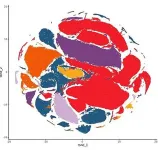(Press-News.org) BELMONT, Mass. (May 23, 2024) Schizophrenia is a complex disease with variable presentations, and the diverse nature of this mental health disorder has made understanding the mechanisms that cause the disease, and subsequently developing effective treatments, especially challenging. In a new study, published May 23 is Science, a team led by McLean Hospital researchers used comprehensive genetic and cellular analyses to shed new light on the intricate molecular mechanisms underlying schizophrenia. Their new work provides a map for how the genes known to increase risk of schizophrenia affect specific cells within the brain.
“We discovered which cell types express genes associated with schizophrenia risk differently, which biological functions are impacted within those cells, and which transcription factors are important for these changes,” explained lead and co-corresponding author, W. Brad Ruzicka MD, PhD, director of the Laboratory for Epigenomics in Human Psychopathology at McLean Hospital. “This understanding will allow future treatments to be tailored to specific genes and cell types, as well as individuals with schizophrenia.”
Schizophrenia affects approximately 24 million people, or 1 in 300 people, worldwide, according to the World Health Organization.
For the new study, a multi-center team of researchers conducted a comprehensive single-cell analysis of transcriptomic changes in human prefrontal cortex, examining postmortem brain tissue from 140 individuals across two independent cohorts. Their analyses included more than 468,000 cells.
They uncovered unprecedented insights into the cellular basis of schizophrenia, linking genetic risk factors to specific neuronal populations. Specifically, the researchers found that excitatory neurons emerged as the most affected cell group, with transcriptional changes implicating neurodevelopment and synapse-related pathways. Additionally, they found that known genetic risk factors for schizophrenia converge on alterations in specific neuronal populations, highlighting the interplay between rare and common genomic variants. Through transcriptomic analysis, two distinct subpopulations of individuals with schizophrenia were identified, marked by the expression of specific excitatory and inhibitory neuronal cell states.
The new study suggests potential links between schizophrenia pathology and processes such as neurodevelopment, synaptic signaling, and transcriptional regulation, implicating key transcriptional regulators associated with both schizophrenia and neurodevelopmental disorders.
The study’s authors anticipate that insights gleaned from this research could pave the way for targeted interventions and personalized treatments for schizophrenia, potentially improving clinical outcomes for individuals affected by this debilitating and often disabling disorder.
The research team is now working to expand on these findings by investigating other regions of the brain and the molecular impact of other psychiatric diseases such as bipolar disorder. They are also pursuing another dimension of complexity in this system by investigating isoform expression of implicated genes and how these cell type-specific gene expression changes lead to functional and potentially druggable changes in the protein space.
“This work advances understanding of schizophrenia pathophysiology at greater detail across both the complex landscape of cells within the brain, and the diverse experiences of people with this disease,” said Ruzicka, who is also associate medical director of Harvard Brain Tissue Resource Center at McLean, and an assistant professor of Psychiatry at Harvard Medical School. “Our increased mechanistic understanding of schizophrenia provides avenues for future research to unravel the genetic and environmental underpinnings of this complex disease so we can provide our patients better care.”
Authorship: In addition to Ruzicka, co-authors from McLean include Sivan Subburaju; Daniel Reed Tso; and Makayla Hourihan.
Additional co-authors include Shahin Mohammadi; John F. Fullard; Jose Davila Velderrain; Shan Jiang6; Hao-Chih Lee; Jaroslav Bendl; PsychENCODE Consortium, Georgios Voloudakis; Vahram Haroutunian; Gabriel E. Hoffman; Panos Roussos; and Manolis Kellis.
Disclosures: The authors declare no competing interests.
Funding: This work was supported by National Institutes of Health (NIH) grant K08MH109759 to W.B.R.; Wilf Family Foundations to W.B.R. A full list of grants received by the authors can be found in the study.
Paper cited: Ruzicka, W. Brad. et al. “Single-cell multi-cohort dissection of the schizophrenia transcriptome” Science, DOI: 10.1126/science.adg5136
About McLean
McLean Hospital has a continuous commitment to put people first in patient care, innovation and discovery, and shared knowledge related to mental health. It is consistently named the #1 freestanding psychiatric hospital in the United States by U.S. News & World Report, and is #1 in America for psychiatric care in 2023-24. McLean Hospital is the largest psychiatric affiliate of Harvard Medical School and a member of Mass General Brigham. To stay up to date on McLean, follow us on Facebook, YouTube, and LinkedIn.
END
Study uncovers cell type-specific genetic insights underlying schizophrenia
2024-05-23
ELSE PRESS RELEASES FROM THIS DATE:
A promising approach to develop a birth control pill for men
2024-05-23
The world’s population has increased by more than 2.6-fold in the last 60 years. The growing trend continues – projections indicate that the number of people living on our planet will grow to 9 billion by 2037 from 8 billion in 2022. These numbers underscore the need for considering family planning; however, there have been limited breakthroughs in contraception in recent decades. Specifically for men, there are no oral contraceptive pills available.
In a study published in the journal Science, researchers at Baylor College of Medicine and collaborating institutions show in animal models that a novel, non-hormonal sperm-specific approach offers a promising option ...
Artificial intelligence approaches demonstrate how plant science has evolved
2024-05-23
Artificial intelligence approaches demonstrate how plant science has evolved
Machine learning also reveals how model systems have changed and how countries differ in terms of research focus and impact
#####
In your coverage, please use this URL to provide access to the freely available paper in PLOS Biology: http://journals.plos.org/plosbiology/article?id=10.1371/journal.pbio.3002612
Article Title: Assessing the evolution of research topics in a biological field using plant science as ...
Birth of universe’s earliest galaxies observed for first time
2024-05-23
Using the James Webb Space Telescope, University of Copenhagen researchers have become the first to see the formation of three of the earliest galaxies in the universe, more than 13 billion years ago. The sensational discovery contributes important knowledge about the universe and is now published in the prestigious journal Science.
For the first time in the history of astronomy, researchers at the Niels Bohr Institute have witnessed the birth of three of the universe's absolute earliest galaxies, somewhere between 13.3 and 13.4 billion years ago.
The ...
New approach to Epstein-Barr virus and resulting diseases
2024-05-23
The Epstein-Barr virus can cause a spectrum of diseases, including a range of cancers. Emerging data now show that inhibition of a specific metabolic pathway in infected cells can diminish latent infection and therefore the risk of downstream disease, as reported by researchers from the University of Basel and the University Hospital Basel in the journal Science.
Exactly 60 years ago, pathologist Anthony Epstein and virologist Yvonne Barr announced the discovery of a virus that has carried their names ever since. The Epstein-Barr virus (EBV) made scientific history as the first virus proven to cause cancer in humans. Epstein and Barr isolated the pathogen, ...
Tracking the cellular and genetic roots of neuropsychiatric disease
2024-05-23
New Haven, Conn. – A new analysis has revealed detailed information about genetic variation in brain cells that could open new avenues for the targeted treatment of diseases such as schizophrenia and Alzheimer’s disease.
The findings, reported May 23 in Science, were the result of a multi-institutional collaboration known as PsychENCODE, founded in 2015 by the National Institutes of Health, which seeks new understandings of genomic influences on neuropsychiatric disease. The study was published alongside related studies in Science, Science Advances, and Science ...
Pioneering new study uncovers insights into PTSD & major depressive disorder
2024-05-23
AUSTIN, Texas — Stress-related disorders like post-traumatic stress disorder and clinical depression are complex conditions influenced by both genetics and our environment. Despite significant research, the molecular mechanisms behind these disorders have remained elusive. However, researchers at Dell Medical School at The University of Texas at Austin have broken new ground with a study that sheds light on the intricate differences occurring in the brains of people with PTSD and depression compared to neurotypical controls. The study, published this week in Science, could provide potential avenues for novel therapeutics and biomarkers.
“Understanding why some people develop ...
Two new studies by Mount Sinai researchers in science offer key insights into the origins and potential treatment of mental health disorders
2024-05-23
Working under the umbrella of the PsychENCODE Consortium, the mental health research project established in 2015 by the National Institutes of Health, a team of Mount Sinai scientists has uncovered important new insights into the molecular biology of neuropsychiatric disease through two new studies published in a special issue of Science on Friday, May 24. These investigations, conducted with colleagues from other major research centers, involve the largest single-cell analysis to date of the brains of people with schizophrenia, and a first-of-its-kind ...
Sequencing of the developing human brain uncovers hundreds of thousands of new gene transcripts
2024-05-23
A team led by researchers at UCLA and the University of Pennsylvania has produced a first-of-its kind catalog of gene-isoform variation in the developing human brain. This novel dataset provides crucial insights into the molecular basis of neurodevelopmental and psychiatric brain disorders and paves the way for targeted therapies.
The research, published in Science, also details how transcript expression varies by cell type and maturity, finding that changing gene-isoform expression levels can help ...
Carnegie Mellon University researchers to tackle carbon use, sustainability through NSF expeditions in computing awards
2024-05-23
Researchers from Carnegie Mellon University's School of Computer Science will contribute to two multi-institution research initiatives aimed at reducing the use of carbon and creating sustainable computing.
The projects recently received funding through the U.S. National Science Foundation's (NSF) Expeditions in Computing Awards program, which is providing $36 million to three projects selected for their potential to revolutionize computing and make significant impacts toward reducing the carbon footprint of the lifecycle of computers. The ...
USDA-NIFA grant supports microwave tech to zap weed seeds
2024-05-23
By John Lovett
University of Arkansas System Division of Agriculture
FAYETTEVILLE, Ark. — It’s not just for burritos and popcorn. Microwave technology is also being tested as a new tool to destroy weed seeds and decrease herbicide use.
Scientists and engineers with the Arkansas Agricultural Experiment Station are investigating the use of 915 MHz microwaves to neutralize a variety of weed seeds underground. The study is supported by a nearly $300,000 Agriculture and Food Research Initiative grant from the U.S. Department of Agriculture’s National Institute of Food and Agriculture, with additional support ...




